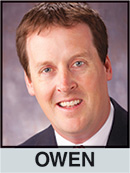 By JAMES OWEN
By JAMES OWEN
The Missouri Legislature is considering a proposal that would allow utilities to specifically target solar customers and charge them a higher fee for the costs they are allegedly adding to the grid. The bill is being pushed by the rural electric cooperatives. In fact, during testimony at the House Utilities Committee, lawmakers were happy to note the lawyer for Associated Electric Cooperative wrote the bill.
(EDITOR’S NOTE: HB 539, sponsored by Rep. Jeff Knight (R-Lebanon), would require customers using solar panels to pay a fee and for those selling generated energy back to the company to pay for access to the grid.)
Of all the issues with the proposed legislation, the biggest problem is that these higher rates for solar customers are proposed without any solid numbers to justify them.
“Trust us,” the cooperatives say, “solar is harmful to our grid and subsidized by non-solar ratepayers.”
TRYING TO PRICE SOLAR OUT OF REACH
Since cooperatives are not regulated by the Public Service Commission like Ameren or Evergy (Missouri’s largest utilities), decisions about raising rates are made by each cooperative’s board of directors with no transparency or openness to the public in regard to the numbers being calculated. If this bill moves forward, utilities, like your local cooperative or small-town electricity provider, can assess any fee on solar customers they want without oversight.
In many states, like Nevada and Kansas, these fees are set to ensure solar is not economically viable for its customers.
The point for the rural electric cooperatives is not to recover costs, but to eliminate solar from the equation. It makes no sense for the Legislature to choose sides and help one industry take out another industry just because a powerful lobby doesn’t like competition.
REDUCES COSTS FOR SOLAR AND NON-SOLAR CUSTOMERS
Some might agree it is a problem that other customers are subsidizing solar users. But a report just released by the Michigan Institute of Technology says the total opposite: solar customers lessen stress to the grid and actually reduce costs for their neighbors. It is the non-solar customer being subsidized, according to their peer-tested study.
Or one might point to the cooperative argument that cooperatives have a right to recover the fixed costs from their customers. That is correct, but they already do that.
Look at your utility bill and you will see a “customer charge.” This is the charge utilities assess every month to cover costs associated with wires, meters, and all other expenses. No matter how much power you use, this amount stays the same. But the cooperatives’ witness – Brent Stewart – admitted cooperatives use a customer charge that doesn’t cover all of their fixed costs. “We do this as a social benefit,” he said. This is sort of tough to swallow when cooperative executives routinely make six-figure salaries even in small-town Missouri. Are “social” considerations factored into the compensation of top-level management?
LAWMAKERS, PUBLIC NEED REAL NUMBERS
These are the arguments from the cooperatives. The primary issue remains that lawmakers, nor the public in general, (have the) numbers on what solar costs utilities or their customers.
In 28 other states, Value of Solar (VoS) studies have provided these answers. Anyone can look up what a commodity like coal or natural gas is worth. Solar is trickier since traders have not figured out how to monetize the sun as a security.
VoS is an independent assessment that shows the true costs to all parties. In almost every case in these other states, the VoS has shown that solar generated by customers actually saves the utility money. Even if a Missouri study shows the opposite, these numbers must be factored into any new law.
The Missouri PSC has ordered the utilities it regulates (Ameren, Evergy, Liberty) to conduct a VoS study. Those results will be available over the next few years. But this will be different for the rural electric cooperatives, which serve sparsely populated areas with different sets of economics to consider.
The Legislature could order the state’s Division of Energy to conduct such a study before ordering a death sentence to an industry with the fastest growing job numbers in the country. Renew Missouri would urge this as sound policy and good governance.
(James Owen is executive director of Renew Missouri, a non-profit based in Columbia dedicated to making Missouri a leading state in clean energy through policy advocacy, litigation, lobbying, public education and social media.)

